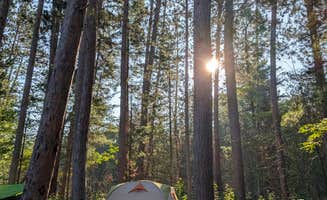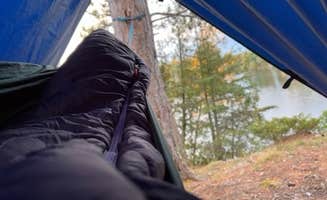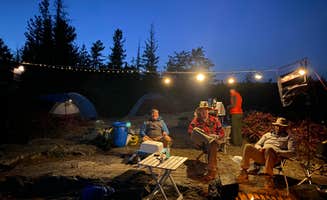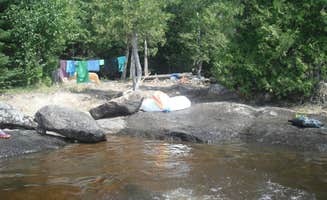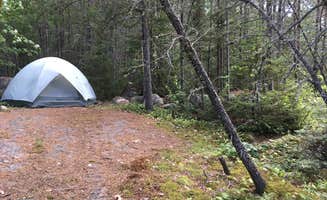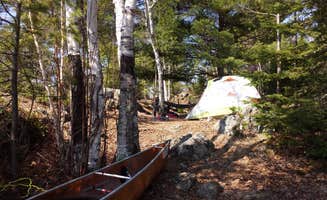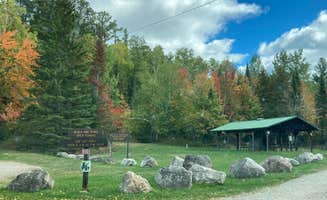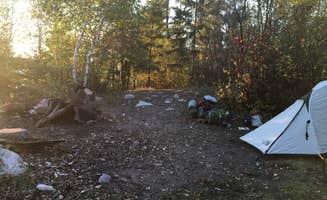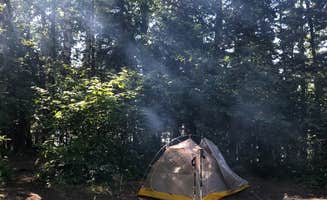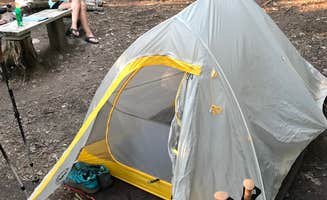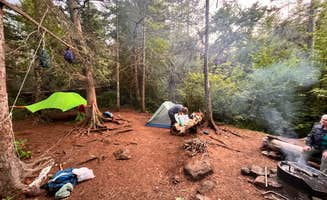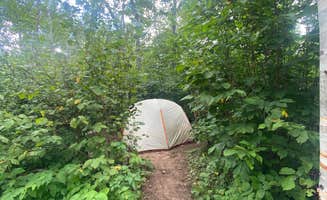Tent camping near Ely, Minnesota sits at the edge of the Boundary Waters Canoe Area Wilderness, where over 2,000 backcountry lakes create a paddler's paradise at 1,500-1,700 feet elevation. The region contains both glacial shield country with exposed bedrock and dense northern boreal forest dominated by white pine, spruce, and birch. Winter temperatures regularly drop below -30°F, while summer brings mild 70-80°F days with cool nights.
What to do
Fishing opportunities: The lakes surrounding Ely offer exceptional fishing for smallmouth bass, northern pike, and walleye. A camper at BWCA Lake Three noted "plenty of fishing spots, although many rocks just offshore ate many of our lures," indicating the rocky substrate common in these shield country lakes.
Berry picking: July and August bring wild blueberry season to the forest floors. At Meander Lake, one visitor highlighted that "In July and August there are wild blueberries everywhere - fun to gather them and delicious to eat!"
Paddling routes: The network of lakes ranges from easy day trips to multi-day expeditions. On Slim Lake, one camper reported "Paddle in is only about 10 min from the entry point. The portage is FIRST from the parking lot - not even a half mile on a very well maintained trail/path that's fairly flat to a very nice landing on Slim Lake."
Swimming: Many campsites feature natural swimming areas. A camper at Meander Lake observed that "the lake is so comfortably warm that in the morning the water is warmer than the air temperature," making it ideal for early morning swims during summer months.
What campers like
Island campsites: Some of the most sought-after spots are on small islands that offer privacy and views. A camper at BWCA Lake Three explained why they chose an island site: "We love the island sites. The kids can run around (and so can the dogs) and no one can really get lost. It was several acres big, covered in tall pines, with little trails all over the place."
First-come sites without permits: Outside the BWCA quota zones, several lakes offer permit-free camping. At Meander Lake, a reviewer noted "There is no permit required nor campground registration needed, so staying here is on a first come first served basis," making it an accessible option for spontaneous trips.
Flat tent pads: In an area with rocky terrain, level tent sites are valued. At BWCA Entry Point: 6 - Slim Lake, one camper was impressed with the "Great flat tent pads!! Under pines, more than enough room for a 6 person, 4 person and a 2 person with room for a few more small tents. Very flat pads (most of them) and all are on pine needles. Soft!"
Quick access options: Not all wilderness camping requires long journeys. At Triangle Lake Campsite, a visitor described it as "About an hour paddle to get there, and includes a portage... A great secluded site for a somewhat easy quick getaway."
What you should know
BWCA permit requirements: From May 1 through September 30, entry permits are required and limited for the Boundary Waters. One camper at BWCA Trout Lake explained: "Sites cannot be reserved but permits must, 1st come 1st serve. Many rules and restrictions of which are gone over at the DNR station when picking up the permit."
Latrine conditions: Toilet facilities vary widely between sites. At BWCA Lake One, a camper warned that "the trail to the toilet was very buggy, very rugged and overgrown and the toilet needed to be emptied or moved (it was really full)." On Slim Lake, another noted the toilet is "up in the woods - normal pit style toilet with no walls, but hidden from camp by trees in the summer."
Portage assistance services: Some entry points offer paid portage services. For Trout Lake, a reviewer mentioned "You can pay $35.00 for a round trip on the portage," which can be helpful for beginners or those with heavy gear.
Water access only: Most backcountry sites require paddling. At Triangle Lake, a camper described it as having "a good landing" but mentioned it's "about an hour paddle to get there, and includes a portage," typical of many sites in the region.
Tips for camping with families
Beginner-friendly campsites: Some locations offer wilderness experience with easier access. At Nels Lake Backcountry Campsites, a reviewer recommended it as "a secluded BWCA experience with easy access" and suggested "You could make this any easy destination weekend campsite, using it a a base for day trips in the area."
Safety considerations: Island sites often provide natural boundaries for children. At BWCA Lake Three, a parent noted the advantages: "The kids can run around (and so can the dogs) and no one can really get lost," plus the site had "Lots of trees mean happy ham-mocking as well!"
Proximity to take-out points: For families, choosing sites near exit points can make departure day easier. At BWCA Lake One, a camper appreciated that their site was "a great location for a quick 2 mile paddle the next morning to take out at the Lake One access."
Multiple tent pads: Family groups often need space for several tents. On Slim Lake, a camper found "Very flat tent pads (most of them) and all are on pine needles. Soft!" with enough space for "a 6 person, 4 person and a 2 person with room for a few more small tents."
Tips from RVers
Base camp options: Some RV sites serve as gateways to wilderness experiences. At Canoe Country Campground and Cabins, a visitor noted it "Offers showers and a restroom. Has a fire pit and grate," making it suitable for families preparing for backcountry trips.
Town proximity: Campgrounds near Ely provide access to resupply. One camper staying in fall mentioned, "The city of Ely is close for supplies and grocery shopping. Two large grocery stores. Friendly people throughout this town."
Seasonal considerations: Some campgrounds have limited operating seasons. Canoe Country Campground operates from "May 15 to Oct 1," with one fall visitor noting, "The campground is very quiet but the fall scenery is beautiful. The trees are blazing in color."


